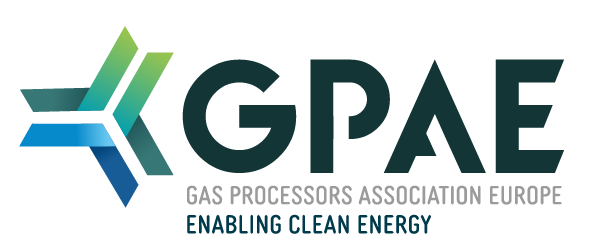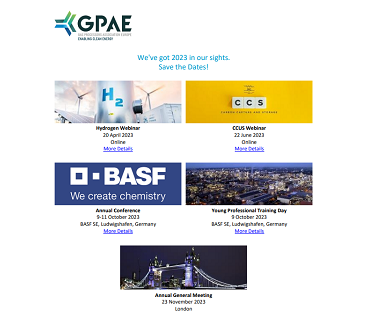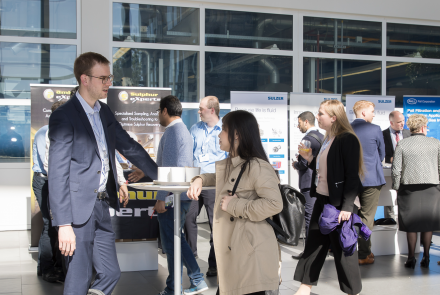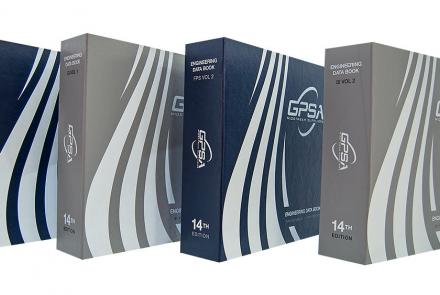GPA Europe February 2023 Newsletter
We've got 2023 in our sights.
Save the Dates!
|
|
|
|
|
Hydrogen Webinar |
CCUS Webinar |
|
|
|
|
|
|
|
|
|
|
Annual Conference |
Young Professional Training Day |
|
|
|
|
|
|
|
||
|
Annual General Meeting |
|
|
Annual Conference
Discover New Horizons in 2023
2023 will be our 40th Birthday and we will be celebrating at our Annual Conference at BASF SE in Germany and hope to see many of you there!
We are finalising plans and will communicate these soon. In the meantime, here is a snapshot of what to expect:
Monday 9 October
Tuesday 10 October
Wednesday 11 October
Call for Papers
Be part of our conferences promoting a new energy future and the transition of our industry towards that future. We are looking for stories about the development of technology and best practices affecting Natural Gas processing. As well as a look at Hydrogen, Biogas, Ammonia, Carbon Capture and Storage, and LNG amongst others, to inspire the gas processing community.
Do you have a story to tell? All we need is a 100-200-word abstract. Send your abstract - Title, Author to [email protected]
It will be reviewed by our Technical Committee and, if accepted, we can help you to develop it into a technical paper and presentation.
Each year we present an award at our AGM for the best paper. The Best Paper Award is selected by our conference attendees and is based on the feedback scores received.
The Aungier Award is for the best paper presented by one of our Young Professionals at our conferences. The winner is decided by our Technical Committee. Alongside the award, the winner will get £1,000!
Could this be you?
As further details become available for our 2023 Events, we bring you essential updates and what else to look out for in 2023.
Stay involved with us in 2023, membership renewals for 2023 have all been sent out and we look forward to seeing you at one of our virtual events, and hopefully conference, this year!
In Brief
|
|
Our November 2022 Issue of In Brief is out on the streets - Check it out! |
Paper of the Month
This month we are looking back to a paper from Filip Cejka, Bryan Research & Engineering, LLC. Presented at our Annual Conference November 2023.
"Comparison of Process Options for Sustainable Ammonia Production"
"Ammonia is one of the most produced chemicals in the world, with a production of about 150 million metric tons a year. It is critical for improved yields in modern agriculture as well as a chemical feedstock to various other processes. Today, Steam Methane Reforming (SMR), which uses fossil based natural gas as its feedstock, is the most widely used method for ammonia production. In this process, the natural gas is used to produce hydrogen, which is then reacted with nitrogen from the air to form ammonia. This technology generates a significant amount of greenhouse gases (GHGs), which has led to proposals for new processes that lower the carbon intensity of ammonia production while still maintaining process efficiency.
One approach for reducing GHGs from the conventional SMR process is either sequestration of vented CO2, carbon capture from process flue gas, or a combination of the two. These methods have sometimes been dubbed “Blue Ammonia”. Another approach, sometimes called “Green Ammonia”, utilizes water electrolysis as its source of hydrogen. The use of water electrolysis allows water and renewable sources of electricity, such as wind and solar, to supplant natural gas as the feedstock for the required hydrogen production. Two categories of electrolysis units include alkaline water electrolysis (AWE) and polymer electrolyte membrane electrolysis (PEM). While the SMR process can use air as its source of nitrogen, the AWE and PEM based technologies require pure nitrogen to be available. A third category of electrolysis, solid oxide electrolysis (SOE), can also generate pure hydrogen from renewable electricity, but unlike AWE and PEM, does not require pure nitrogen. SOE also provides additional avenues of heat integration between hydrogen production and ammonia synthesis that is lacking from the other electrolysis technologies.
A comparison is made between the various newer technologies to a conventional SMR system using a steady-state simulator. This comparison includes the configuration and requirements of each system, as well as each system’s carbon intensity and power requirements per ton of ammonia produced."
GPSA Engineering Databook CDs - 14th Edition
We have 14th Edition GPSA Engineering Databook CDs available with up to the minute improvements and the latest data in SI Format.
The GPSA Engineering Databook is almost 1,000 pages of technical information and is the worldwide authoritative resource for technical and design information.
GPAE members receive a £50/€60 discount.
Every process engineer should have one!
Gulf Energy Information
Our media partner Gulf Energy Information has just launched a new technical publication, H2Tech, serving engineers and professionals in the hydrogen sector.
If you would like to register for a free trial subscription to the weekly e-newsletter or the quarterly magazine, just click on the graphic below:




